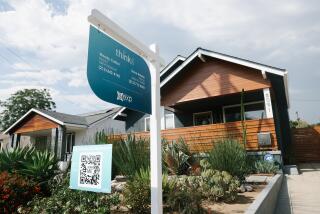Lenders in settlement to make payouts to foreclosed borrowers
As part of a settlement with federal regulators, 13 lenders this week are starting to pay out $3.6 billion to more than 4 million troubled borrowers whose homes were in foreclosure proceedings in 2009 and 2010.
A chart released Tuesday by the regulators showed that most of the borrowers would receive $300, the minimum allowed under the settlement terms. The maximum of $125,000 would go to 1,135 borrowers whose homes were seized while they were serving in the military or who were current on their payments.
The settlement replaces a failed process in which bank regulators required large mortgage servicers to hire consultants to audit foreclosures for wrongdoing. The process proved so costly and time-consuming that it was called off, and the independent auditors were replaced by the general settlement — a debacle that has drawn criticism from advocacy groups and others.
“The independent auditors should be asked to return some or half of the $2 billion that they charged to audit for nothing,” said Faith Bautista, president of the National Asian American Coalition.
Bautista, who lost her own home to foreclosure in 2009, called the settlement payments “grossly inadequate.”
The first wave of checks, totaling $1.2 billion, is to be sent Friday, with 90% of the payments to be made by the end of April, according to the Federal Reserve and the Office of the Comptroller of the Currency, the Treasury Department agency that regulates national banks.
Another wave of payments, to be made after borrowers provide additional information, will go out in mid-July, the Fed and OCC said. The check recipients will total about 4.2 million.
The agreement is separate from a $26-billion settlement that the five biggest mortgage servicers reached to put an end to foreclosure-abuse investigations by state attorneys general, the U.S. Justice Department and the U.S. Department of Housing and Urban Development.
Payments from 11 of the 13 mortgage servicers are to be sent by the end of July. The payment schedule for the other two servicers — Wall Street giants Morgan Stanley and Goldman Sachs — weren’t yet available, the regulators said.
The banks also agreed to provide $5.7 billion in foreclosure-prevention aid as part of the settlement, bringing the total relief to $9.3 billion.
“We’re focused on giving consumers relief as soon as possible,” said OCC spokesman Bryan Hubbard.
But critics continued to hammer the agency as the checks went out. Regulators, banks and consultants “botched the whole process,” said Sasha Werblin, director of the economic equity program at the Greenlining Institute, a Berkeley advocacy group for lower-income people and neighborhoods.
Regulators ordered banks to send letters to eligible borrowers at the end of 2011, informing them that they could apply for independent reviews if they were in the foreclosure process in 2009 and 2010. Legal shortcuts, lost paperwork and improper fees were common at that time as banks struggled to handle the enormous wave of delinquencies.
But response from borrowers was weak, and critics said the letters resembled foreclosure-avoidance scams. The regulators extended the deadline for borrowers to apply for the reviews three times, then started an outreach program last November, using radio public-service announcements and recruiting housing counselors and advocacy groups to spread the word.
As the response deadline ran out at the end of last year, the banks and regulators hashed out the agreement to make wide-ranging payments, with borrowers who had applied for reviews receiving more than those who had not.
“Even if you were in foreclosure because you messed up, you still get some money,” said Werblin, who blamed the regulators’ inside-the-Beltway mentality for contributing to the failed review program.
“Because of their inability to connect with real people,” she said, “we now have this settlement that gives money to people who don’t deserve it, and therefore less money for those that do.”
Payments will be handled by an outside firm, Rust Consulting. Borrowers can call Rust at (888) 952-9105 to update their contact information or to verify that they are covered by the agreement.
Information provided to Rust will be used only for purposes related to the agreement, the regulators said. They warned borrowers to beware of scams and anyone asking them to call a different number or to pay a fee to receive payment under the agreement.
Accepting a payment will not prevent borrowers from pursuing additional legal action against banks. The servicers are not permitted to ask borrowers to sign a waiver of any legal claims.







